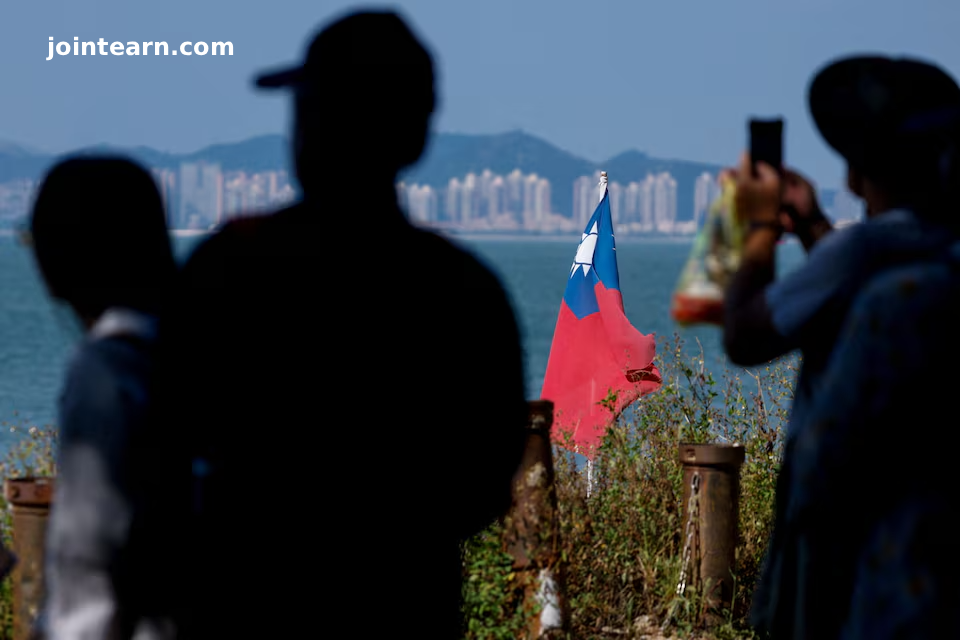
Beijing Toughens Its Tone on Taiwan
BEIJING/TAIPEI, Oct. 29, 2025 — China issued one of its strongest warnings yet over Taiwan, declaring that it “absolutely will not” rule out the use of force to achieve reunification. The statement came just a day before U.S. President Donald Trump and Chinese President Xi Jinping are set to meet in South Korea for high-level talks.
During a press briefing in Beijing, Peng Qing’en, spokesperson for China’s Taiwan Affairs Office, emphasized that while Beijing favors peaceful reunification under the “One Country, Two Systems” model, it reserves the right to take military action if necessary.
“We are willing to create ample space for peaceful reunification and will spare no effort to pursue this prospect with the utmost sincerity,” Peng said. “However, we absolutely will not renounce the use of force and reserve the option to take all necessary measures.”
This marks a noticeable hardening of China’s rhetoric following a series of more conciliatory commentaries in Xinhua News Agency earlier in the week that described how “patriots” could govern Taiwan after unification while allowing the island to retain aspects of its social system.
Taiwan Responds with Defiance
In Taipei, Taiwan’s President Lai Ching-te responded firmly, calling for the island to show resilience and unity against mounting Chinese pressure.
“Taiwan must not only demonstrate its resolve to defend its homeland but also firmly oppose annexation, aggression, and the advancement of unification,” Lai said in remarks released by his office.
Lai’s statement underscores Taipei’s consistent stance of rejecting Beijing’s sovereignty claims and its vision of forced reunification.
Taiwan’s National Security Bureau Director-General Tsai Ming-yen dismissed China’s so-called “patriots model,” describing it as an attempt to impose the same political controls seen in Hong Kong and Macau.
“The goal is to weaken Taiwan’s international status and turn it into another Hong Kong or Macau, eliminating its sovereignty,” Tsai said. “This model has no place in Taiwan.”
Beijing Pushes “Peaceful Reunification” Narrative
China’s renewed focus on “peaceful reunification” comes as it faces increasing geopolitical pressure and economic challenges, as well as growing U.S. support for Taiwan.
Wang Huning, the Communist Party’s fourth-ranking leader and head of Taiwan policy, avoided mentioning military action in his major policy speech last weekend, instead claiming both sides would benefit economically and socially from reunification.
However, analysts say the combination of Wang’s softer rhetoric and Peng’s sharper warning reflects Beijing’s “carrot-and-stick” approach — offering promises of prosperity while keeping the threat of military action alive.
Trump–Xi Meeting Looms as Diplomatic Flashpoint
The timing of China’s statement is significant. Trump and Xi are scheduled to meet on Thursday in Busan, South Korea, marking the final stop of Trump’s Asia tour. The summit is expected to focus on trade, security, and U.S.-China relations, but Taiwan remains a potential flashpoint.
Trump told reporters he was uncertain whether Taiwan would even be discussed during his meeting with Xi. Yet, with China openly reasserting its willingness to use force, the issue could dominate behind-the-scenes discussions.
Beijing’s foreign ministry said the upcoming talks are intended to “inject new momentum into U.S.-China relations,” though U.S. officials privately acknowledge tensions over Taiwan, trade tariffs, and semiconductor technology are unlikely to ease soon.
Growing Military and Political Tensions
China’s military has increased air and naval operations around Taiwan throughout 2025, heightening fears of miscalculation. Taiwan continues to bolster its defenses, with strong U.S. backing and new weapons systems in development.
China refuses to engage directly with President Lai, branding him a “separatist”, a position that has deepened diplomatic isolation between Beijing and Taipei.
Taiwan, which transitioned to full democracy in the 1990s, held its first direct presidential election in 1996 and remains one of Asia’s most vibrant democracies. Unlike Hong Kong’s restricted political system, Taiwan allows a full spectrum of political debate, including pro-independence and pro-Beijing viewpoints.
Global Implications
China’s renewed warning and the upcoming Trump–Xi meeting have global implications. The statement not only sends a message to Taipei but also serves as a strategic signal to Washington and its allies.
Observers say the hardline rhetoric aims to remind the world — particularly the United States — that Taiwan remains Beijing’s top red line. As tensions rise, regional security experts warn that any misstep could push the Taiwan Strait closer to confrontation.
For now, both sides remain locked in a high-stakes standoff, with Beijing’s patience waning and Taiwan’s resolve hardening — a dynamic that will continue to test U.S.-China relations well into 2026.


Leave a Reply